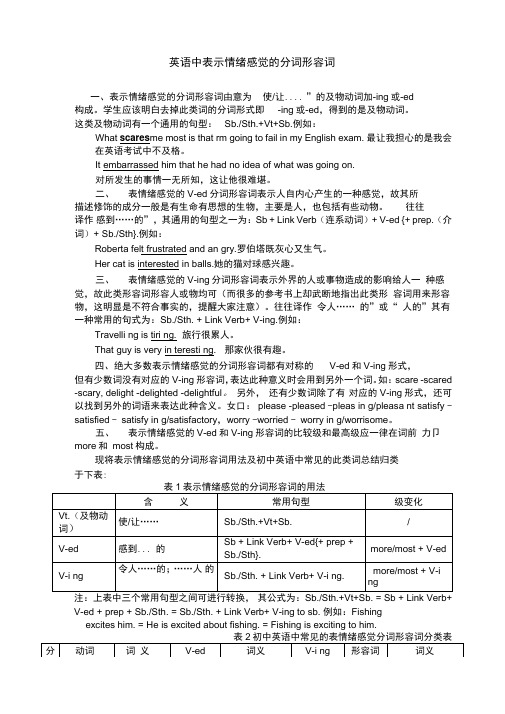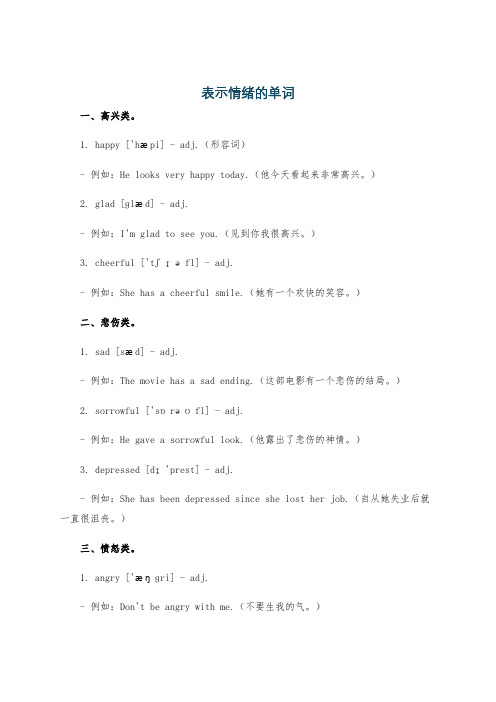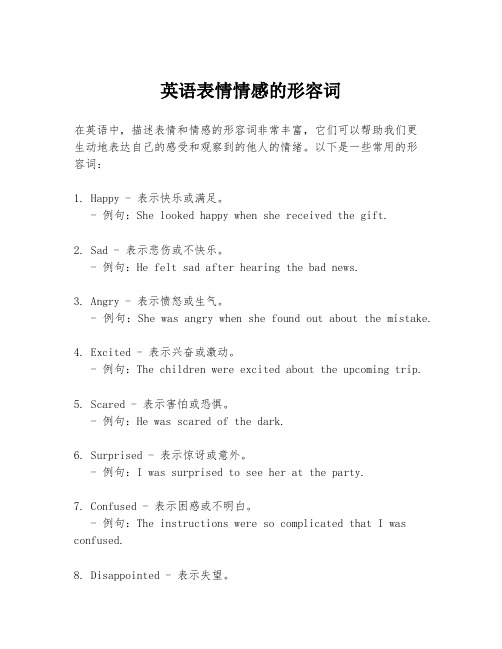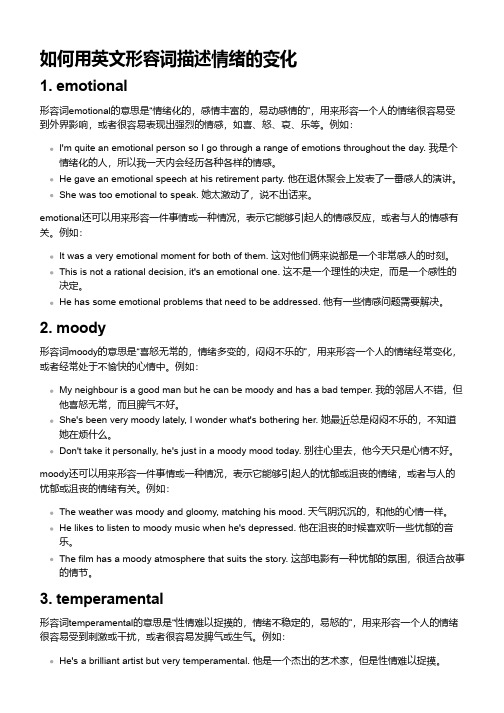谈谈初中英语中表示情绪感觉的分词形容词
情绪形容词英语

情绪形容词英语在日常生活中,人们经常会用到形容词来描述自己的情绪状态,例如“开心”、“悲伤”、“愤怒”等等。
而英语中也有许多形容词来表达情绪,不仅可以丰富我们的词汇量,还可以帮助我们更准确地表达自己的情感。
本文将介绍一些常用的情绪形容词,并且会给出一些例句帮助读者更好地理解和掌握它们的用法。
1. Happy(开心)这是最常用的情绪形容词之一,表示感到愉快和快乐。
它可以用来描述任何形式的快乐,从轻微的满足到极度的幸福。
例如:- I'm so happy to see you!(见到你我非常开心!)- She's always happy when she's with her friends.(她和朋友在一起时总是很开心。
)- Winning the competition made him really happy.(赢得比赛让他非常开心。
)2. Sad(悲伤)这个形容词表示感到悲伤和难过。
它可以用来描述任何程度的悲伤,从轻微的失落到极度的悲痛。
例如:- I feel really sad when I think about my grandmother who passed away.(想到已经去世的奶奶,我感到非常悲伤。
)- He looked sad after hearing the bad news.(听到坏消息后,他看起来很难过。
)- The movie ending was so sad that I couldn't stop crying.(电影结局太悲伤了,我止不住地哭了。
)3. Angry(愤怒)这个形容词表示感到愤怒和生气。
它可以用来描述任何程度的愤怒,从轻微的不满到极度的暴怒。
例如:- She was really angry when she found out that her boyfriend had cheated on her.(当她发现男朋友出轨时,她非常生气。
初中英语语法 形容词在修饰情感时有哪些常用词汇

初中英语语法形容词在修饰情感时有哪些常用词汇初中英语语法知识点:形容词在修饰情感时的常用词汇形容词在修饰情感时,可以用一些常用的词汇来表达不同的情感。
以下是一些常见的形容词,用于描述情感:1. Happy(快乐的)-表示高兴、满足或愉快的情感。
例句:I feel happy when I spend time with my friends.2. Sad(伤心的)-表示悲伤、失望或沮丧的情感。
例句:She felt sad when her pet dog passed away.3. Excited(兴奋的)-表示兴奋、激动或热情的情感。
例句:I am excited about going on vacation next week.4. Nervous(紧张的)-表示紧张、焦虑或不安的情感。
例句:He was nervous before giving a presentation in front of the class.5. Angry(生气的)-表示愤怒、恼火或不满的情感。
例句:She was angry when her brother broke her favorite toy.6. Surprised(惊讶的)-表示惊讶、吃惊或意外的情感。
例句:I was surprised to see my friend at the party.7. Frustrated(沮丧的)-表示沮丧、失望或受挫的情感。
例句:He felt frustrated when he couldn't solve the math problem.8. Confused(困惑的)-表示困惑、迷茫或不理解的情感。
例句:She was confused about the instructions for the assignment.9. Proud(自豪的)-表示自豪、骄傲或得意的情感。
例句:He felt proud of his achievement in the competition.10. Grateful(感激的)-表示感激、感谢或感恩的情感。
谈谈初中英语中表示情绪感觉的分词形容词

英语中表示情绪感觉的分词形容词一、表示情绪感觉的分词形容词由意为使/让.... ”的及物动词加-ing或-ed构成。
学生应该明白去掉此类词的分词形式即-ing或-ed,得到的是及物动词。
这类及物动词有一个通用的句型:Sb./Sth.+Vt+Sb.例如:What scares me most is that rm going to fail in my English exam. 最让我担心的是我会在英语考试中不及格。
It embarrassed him that he had no idea of what was going on.对所发生的事情一无所知,这让他很难堪。
二、表情绪感觉的V-ed分词形容词表示人自内心产生的一种感觉,故其所描述修饰的成分一般是有生命有思想的生物,主要是人,也包括有些动物。
往往译作感到……的”,其通用的句型之一为:Sb + Link Verb(连系动词)+ V-ed {+ prep.(介词)+ Sb./Sth}.例如:Roberta felt frustrated and an gry.罗伯塔既灰心又生气。
Her cat is interested in balls.她的猫对球感兴趣。
三、表情绪感觉的V-ing分词形容词表示外界的人或事物造成的影响给人一种感觉,故此类形容词形容人或物均可(而很多的参考书上却武断地指出此类形容词用来形容物,这明显是不符合事实的,提醒大家注意)。
往往译作令人…… 的”或“人的”其有一种常用的句式为:Sb./Sth. + Link Verb+ V-ing.例如:Travelli ng is tiri ng. 旅行很累人。
That guy is very in teresti ng. 那家伙很有趣。
四、绝大多数表示情绪感觉的分词形容词都有对称的V-ed和V-ing形式,但有少数词没有对应的V-ing形容词,表达此种意义时会用到另外一个词。
如:scare -scared -scary, delight -delighted -delightful。
在英语中如何表达“情绪”

在英语中如何表达“情绪”常见表示情绪的形容词有:blue/down/depressed 忧郁的,情绪低落的blue:He'd been feeling blue all week.他整个星期都郁郁不乐。
down:I feel a bit down today.我今天有点闷闷不乐。
depressed:She felt very depressed about the future.她感到前途无望。
sorry/sad 难过的sorry:I'm sorry that your husband lost his job.你丈夫把工作丢了,我很惋惜。
sad:I was sad that she had to go.知道她得走了,我心里很难过。
happy 高兴的You don't look very happy today.你今天好像不太高兴。
excited 兴奋的The children were excited about opening their presents. 孩子们对打开礼物感到兴奋不已。
light-hearted 心情欢快的They were light-hearted and prepared to enjoy life.他们无忧无虑,随时准备享受生活。
heavy-hearted 心情沉重的My heart is heavy./ I'm heavy-hearted.我心情很沉重。
crazy 疯狂的She must be crazy to lend him money.她把钱借给他,一定是疯了。
bored 百无聊赖的There was a bored expression on her face.她脸上有一种厌倦的表情。
pissed/mad/angry 生气的,恼怒的pissed:You know Molly's pissed at you.你知道莫莉在生你的气。
表示情绪的单词

表示情绪的单词一、高兴类。
1. happy ['hæpi] - adj.(形容词)- 例如:He looks very happy today.(他今天看起来非常高兴。
)2. glad [ɡlæd] - adj.- 例如:I'm glad to see you.(见到你我很高兴。
)3. cheerful ['tʃɪəfl] - adj.- 例如:She has a cheerful smile.(她有一个欢快的笑容。
)二、悲伤类。
1. sad [sæd] - adj.- 例如:The movie has a sad ending.(这部电影有一个悲伤的结局。
)2. sorrowful ['sɒrəʊfl] - adj.- 例如:He gave a sorrowful look.(他露出了悲伤的神情。
)3. depressed [dɪ'prest] - adj.- 例如:She has been depressed since she lost her job.(自从她失业后就一直很沮丧。
)三、愤怒类。
1. angry ['æŋɡri] - adj.- 例如:Don't be angry with me.(不要生我的气。
)2. mad [mæd] - adj.(口语中常用,比较生气、愤怒的意思,也有“发疯的”意思)- 例如:He is mad at his brother.(他对他的兄弟很生气。
)3. furious ['fjʊəriəs] - adj.(非常愤怒的)- 例如:He was furious when he heard the news.(当他听到这个消息时非常愤怒。
)四、惊讶类。
1. surprised [sə'praɪzd] - adj.- 例如:She was surprised to see him there.(她很惊讶在那里看到他。
初中英语中考情绪类词语汇总(开心+愤怒+悲伤+好奇+嫉妒)

中考英语情绪类词语一、表示开心1.Joyful/Joyous 喜悦的;愉悦的A cup of icy cola makes me joyful/joyous enough.一杯冰冻可乐足以让我快乐了。
2.amused 喜悦的;开心的I was extremely amused at the contents of this movie.我对这部影片所讲内容感到特别喜悦。
3.delighted 欣喜的;惬意的Teacher Ho was delighted with the gift that Mary give her on the Teachers' Day. 何老师对玛丽给她的教师节礼物感到非常欣喜。
4.pleased/content 满意的;满足的The passenger seemed to be quite pleased/content with what the flight attendants did. 这位乘客似乎对空乘的所作所为感到挺满意的。
5.thrilled 兴奋的;极其激动的Catherine was so thrilled at the prize she won in the speech contest.凯萨琳为自己在演讲比赛夺得的奖项感到极其的兴奋。
6.wild with joy 欣喜若狂的The holidays began! Everyone was wild with joy.假期开始了!个个都欣喜若狂。
7.on top of the world 开心得不得了Juliet was simply on top of the world when she saw Jason.当朱莉亚见到杰森的时候,简直开心得不得了8.in high spirits 情绪高涨All the children answered their teachers' questions in high spirits.所有的孩子都兴高采烈地回答老师的提问。
英语表情情感的形容词

英语表情情感的形容词在英语中,描述表情和情感的形容词非常丰富,它们可以帮助我们更生动地表达自己的感受和观察到的他人的情绪。
以下是一些常用的形容词:1. Happy - 表示快乐或满足。
- 例句:She looked happy when she received the gift.2. Sad - 表示悲伤或不快乐。
- 例句:He felt sad after hearing the bad news.3. Angry - 表示愤怒或生气。
- 例句:She was angry when she found out about the mistake.4. Excited - 表示兴奋或激动。
- 例句:The children were excited about the upcoming trip.5. Scared - 表示害怕或恐惧。
- 例句:He was scared of the dark.6. Surprised - 表示惊讶或意外。
- 例句:I was surprised to see her at the party.7. Confused - 表示困惑或不明白。
- 例句:The instructions were so complicated that I was confused.8. Disappointed - 表示失望。
- 例句:He was disappointed when his team lost the game.9. Frustrated - 表示沮丧或挫败。
- 例句:She felt frustrated with the constant delays.10. Tired - 表示疲倦或劳累。
- 例句:After a long day, he was very tired.11. Proud - 表示自豪或骄傲。
- 例句:She was proud of her son's achievements.12. Embarrassed - 表示尴尬或羞愧。
英文的形容词形容情绪波动很大

如何用英文形容词描述情绪的变化1. emotional形容词emotional的意思是“情绪化的,感情丰富的,易动感情的”,用来形容一个人的情绪很容易受到外界影响,或者很容易表现出强烈的情感,如喜、怒、哀、乐等。
例如:I'm quite an emotional person so I go through a range of emotions throughout the day. 我是个情绪化的人,所以我一天内会经历各种各样的情感。
He gave an emotional speech at his retirement party. 他在退休聚会上发表了一番感人的演讲。
She was too emotional to speak. 她太激动了,说不出话来。
emotional还可以用来形容一件事情或一种情况,表示它能够引起人的情感反应,或者与人的情感有关。
例如:It was a very emotional moment for both of them. 这对他们俩来说都是一个非常感人的时刻。
This is not a rational decision, it's an emotional one. 这不是一个理性的决定,而是一个感性的决定。
He has some emotional problems that need to be addressed. 他有一些情感问题需要解决。
2. moody形容词moody的意思是“喜怒无常的,情绪多变的,闷闷不乐的”,用来形容一个人的情绪经常变化,或者经常处于不愉快的心情中。
例如:My neighbour is a good man but he can be moody and has a bad temper. 我的邻居人不错,但他喜怒无常,而且脾气不好。
She's been very moody lately, I wonder what's bothering her. 她最近总是闷闷不乐的,不知道她在烦什么。
- 1、下载文档前请自行甄别文档内容的完整性,平台不提供额外的编辑、内容补充、找答案等附加服务。
- 2、"仅部分预览"的文档,不可在线预览部分如存在完整性等问题,可反馈申请退款(可完整预览的文档不适用该条件!)。
- 3、如文档侵犯您的权益,请联系客服反馈,我们会尽快为您处理(人工客服工作时间:9:00-18:30)。
使满 意; 使满 足; 使高 兴
satisfied
满意
的;
满足 的;
satisfying
称心
的
satisfactory
使高
高兴
兴;
的;
delight
使愉 快;
delighted
愉快 的;
/
delightful
使快
快乐
乐
的
confuse
使糊 涂;使 confused 困惑
困惑
的; 糊涂
confusing
/
使感
奇
到意
怪/
外
意外
的
使激
动;
兴奋
excite
使兴 奋;
excited
的; 激动
exciting
/
使有
的
热情
兴
奋
thrill
使狂 喜; 使激 动; 使极 度兴 奋
thrilled
欣喜
若狂
的; 非常
thrilling
开心
的
/
frighten
使惊 恐;使 frightened 害怕;
受惊
的; 害怕
frightening
表2 初中英语中常见的表情绪感觉分词形容词分类表
分 类
动词
词 义
V-ed
词 义
V-ing 形容词
使惊
吃惊
amaze
奇; 使惊
amazed
的, 惊奇
amazing
/
愕
的
shock
惊
使震 惊; 使惊 愕; 打击
shocked
惊愕
的, 受震
shocking
惊的
/
奇
惊奇
使惊
的;
奇;
惊讶
使诧
的;
surprise 异; surprised 感到 surprising
6、delight It was the most _________ garden I had ever seen. The report has ___________ environmentalists(环境保护主义者). I know Frank will be ___________ to see you.
4、confuse Linda stood by the door, _______ and surprised. The instruction was really __________ . The crossword ________ him all day yesterday.
5、convince It is difficult to __________ the public that its operations are safe. He sounded very __________ . He was _________ that I was part of the problem...
英语中表示情绪感觉的分词形容词
一、表示情绪感觉的分词形容词由意为“使/让……”的及物动词加ing或-ed构成。学生应该明白去掉此类词的分词形式即-ing或-ed,得到 的是及物动词。这类及物动词有一个通用的句型:Sb./Sth.+Vt+Sb. 例 如:
What scares me most is that I'm going to fail in my English exam. 最让我担心的是我会在英语考试中不及格。
使放
松弛
relax
松; 使松
relaxed
的; 安心
relaxing
/
弛
的;
轻松
的
使产
生兴
interest
趣; 使参 interested 与,
感兴 趣的
interesting
/
使加
入
[巩固练习] 用所给词的正确形式填空: 1、amaze
He __________ us his knowledge of Chinese history. It's __________ what we can remember with a little help. I was __________ to learn she was still writing her stories.
Verb+ V-ing.
+ V-ing
注:上表中三个常用句型之间可进行转换,其公式为:Sb./Sth.+Vt+Sb. = Sb + Link Verb+ V-ed + prep + Sb./Sth. = Sb./Sth. + Link Verb+ V-ing to sb. 例如:Fishing excites him. = He is excited about fishing. = Fishing is exciting to him.
discouraged
的; 气馁
discouraged
/
丧
的;
沮丧
的
使确
确信
信;
的;
convince
使信 服;
convinced
深信 的;
convincing
/
使相
坚信
信
的
使尴
窘迫
尬;
的;
embarrass
使窘 迫;
embarrassed
惭愧 的;
embarrassing
/
使害
尴尬
羞
的
其
它
放松 的;
的
/
困
惑
迷惑
puzzle
使迷 惑; 使困 惑
puzzled
的; 困惑 的; puzzling 无法
/
理解 的
使生
annoy
气; 使不 耐 烦; 使烦
annoyed
生气
的; 恼怒
annoying
的
/
恼
厌
使厌
厌恶
烦 disgust
恶; 使憎
disgusted
的; 憎恶
disgusting
/
恶
的
感到
使厌
8、disappoint You should have accepted that. I'm __________ in you. She knew that she would _________ him. The performance of the soccer team is always _________ .
失意 的,
frustrating
/
使愤
泄气
怒
的
失望
的,
disappoint
使失 望
disappointed
沮丧 的,
disappointing
/
失意
失
的
望
使抑
抑郁
郁;
的;
depress
使沮 丧;
depressed
沮丧 的;
depressing
/
使消
消沉
沉
的
泄气
的;
使泄
灰心
discourage
气; 使沮
11、embarrass That was an __________ situation for me. His shyness __________ him. He looked a bit ___________ .
